Music
Trailers
DailyVideos
India
Pakistan
Afghanistan
Bangladesh
Srilanka
Nepal
Thailand
StockMarket
Business
Technology
Startup
Trending Videos
Coupons
Football
Search
Download App in Playstore
Download App
Best Collections
Technology
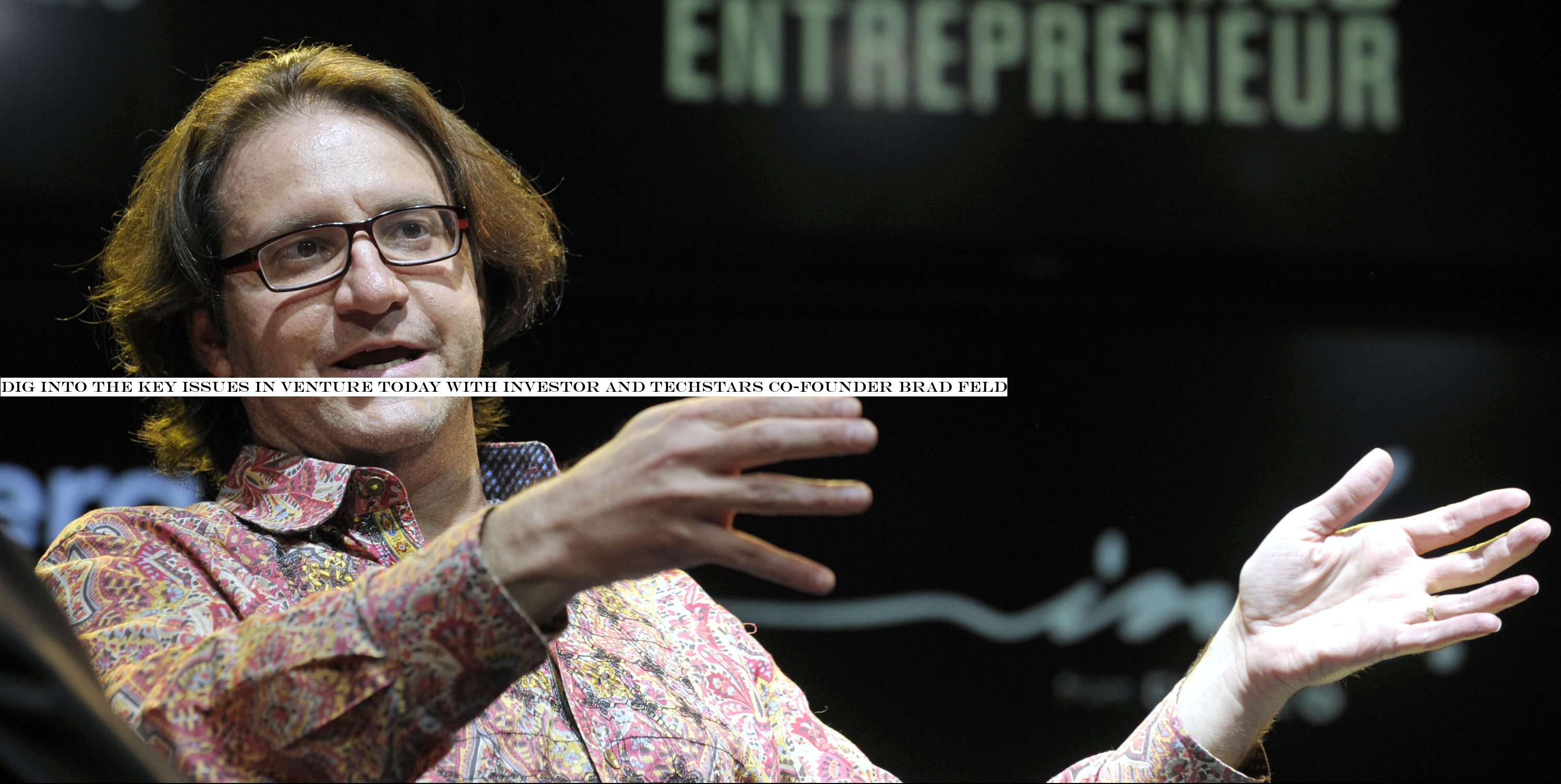
Few can hold a candle to Brad Feld list of accolades in the startup, tech and venture world. As a multi-time founder of both startups and venture firms alike, Feld is widely known for having co-founded the Techstars accelerator — now a Silicon Valley and startup institution — as well as Foundry Group, the early and growth-stage venture fund that has raised nearly $2.5 billion over seven funds, in just over a decade.
Feld is equally, if not more, recognized outside of the investing world as a thought leader through both his widely followed blog &Feld Thoughts& and through authoring a number of books and guides to the startup and venture worlds. Feld recently published the fourth edition of his acclaimed and seemingly timeless book &Venture Deals: Be Smarter Than Your Lawyer And Venture Capitalist& (which he co-authored with Foundry Group co-founder Jason Mendelson), which acts as a manual to raising venture capital by walking through tactical advice around negotiating a term sheet, what to consider when selling your business, arguments for and against convertible debt and much more.
TechCrunchSilicon Valley editorConnie Loizos will be sitting down with Brad for an exclusive conversation this Thursday, October 10th at 11:00 am PT on Extra Crunch. Brad, Connie and Extra Crunch members will be digging into the latest edition of &Venture Deals,& Bradadvice to founders and investors and his take on hot-button issues of the day (including dual-class shares, direct listings and what happened at WeWork).
Extra Crunch members will also have the opportunity to ask questions! We will pause during the call to take questions from Extra Crunch subscribers. Alternatively, you can email questions to This email address is being protected from spambots. You need JavaScript enabled to view it..
Tune in to join the conversation and for the opportunity to ask Brad and Connie any and all things venture.
To listen to this and all future conference calls, become a member of Extra Crunch.Learn more and try it for free.
- Details
- Category: Technology
Read more: Dig into the key issues in venture today with investor and Techstars co-founder Brad Feld
Write comment (91 Comments)The beauty of podcasting is that anyone can do it. Ita rare medium thatnearly as easy to make as it is to consume. And as such, no two people do it exactly the same way. There are a wealth of hardware and software solutions open to potential podcasters, so setups run the gamut fromNPRstudios to USB Skype rigs.
We&ve asked some of our favorite podcast hosts and producers to highlight their workflows — the equipment and software they use to get the job done. The list so far includes:
Criminal/This Is LoveLauren SpohrerJeffrey Cranor of Welcome to Night ValeJesse Thorn of BullseyeBen Lindbergh of Effectively WildMy own podcast, RiYL

This week, we&ve got the producer and &fourth co-host& of Broken Record, Justin Richmond. Richmond actually does much of the talking for the popular music podcast, but you would probably bill yourself as number four if you were sharing mic time with Rick Rubin, Malcolm Gladwell and former New York Times editor Bruce Headlam.
The show aims to serve as aural linear notes in an era when musical context has gone the way of the 8-track and the original Ramones. The showguests have been a whowho of popular musicians, including recent guests Jack White, Tyler the Creator and Ezra Koenig. Season three of the show kicked off recently and is available for listening at Broken Record Podcast. Next week, Richmond will interview rapper, producer, actor and former Fugee, Wyclef Jean.
Most days I work out of the greatest podcast studio there is: Shangri La, perched above one of my favorite Malibu beaches. OK, it might not be apodcaststudio. Built by Bob Dylanband,TheBand, in the mid &70s, itwhere they recorded their last album as a group. They also taped the interview scenes from &The Last Waltz& there with Martin Scorsese. Bob Dylantour bus was marooned there and has since been turned into a recording space. Black Sabbath recorded their last record there. Neil Young has used it, Run the Jewels, Eric Clapton, Kendrick Lamar … everyone. Itone of the perks of working on a podcast with Rick Rubin.
There are two studios at Shangri La we typically use. One is in the main studio, with a beautiful API console and U87 microphones. Rick and a guest sit in the control room above the studio&live& room and overlook a beautiful green landscape and the ocean. Typically the windows are open so you can often hear helicopters flying by, motorcycles speeding down PCH or birds chirping. But it gives the recordings character. The other place we record is in what we call &The Chapel.& Ita small charming building that looks like, you guessed it, a chapel. We also use U87down there and the console is from the famed Muscle Shoals studio in Alabama. It used to be at Rickold Laurel Canyon studio where he recorded the Red Hot Chili Peppers and countless other groups in the &90s and early 2000s. These bits of history are what make creating a music podcast from there so surreal and fun.
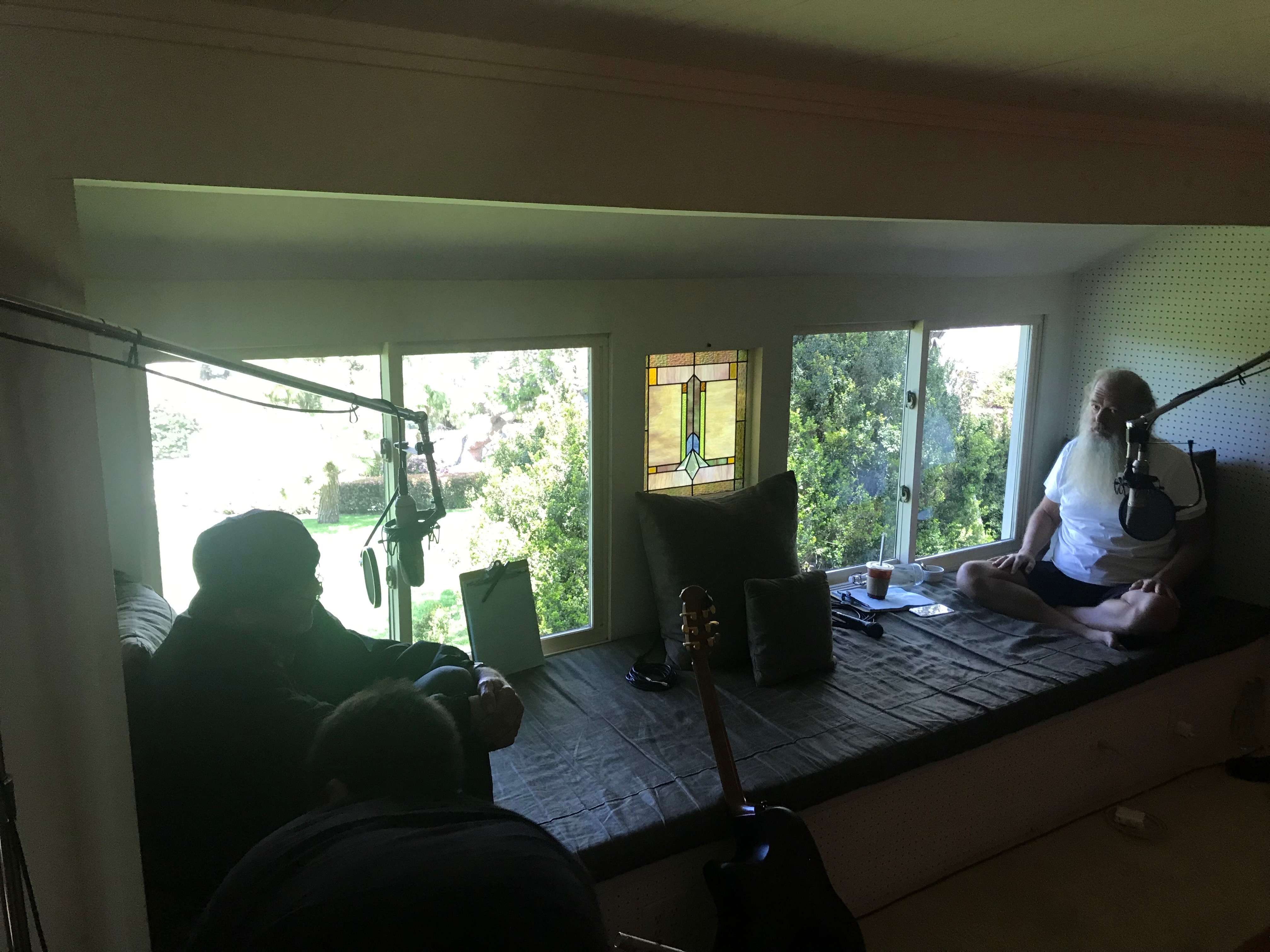
But some days my studio space is challenging (though, honestly, still very fun). Our first episode for Season 3, for example, is Malcolm and Rick talking with the Raconteurs — primarily Brendan Benson and Jack White. We taped the episode in Jack Whitesunroom at a home of his in the Detroit area. As you can tell from the picture, ita beautiful space, but therea lot going on … and we&re far from our usual Malibu digs. Luckily, Bill Skibbe, who does the mastering for JackThird Man Records stuff, was able to pull up with a wonderful mobile rig.
However, Rick wasn&t in Michigan — he was in Italy. We were initially going to have him FaceTime in and sync himself with an RE-20 on his end, but the internet on both ends was a little shoddy. So we ended up putting my iPhone in the middle of the room with Rick on speaker. It was a nightmare to reduce the bleed of any and every sound coming through the phone on Rickend, but we painstakingly got it done.
Because Rick, Malcolm and Bruce keep very busy schedules we have a bunch of other studios lined up across the country that provide wildly different environments. But somehow we&re managing to unify the Broken Record sound.
- Details
- Category: Technology
Read more: How I Podcast: Broken Record’s Justin Richmond
Write comment (97 Comments)Maveron, Slow Ventures and Female Founders Fund have invested $10 million in a startup that claims itcarving a new path to sobriety.
Tempest offers a $647 eight-week virtual &sobriety school& to help people, particularly women and &historically oppressed individuals,& get sober. The program is led by the companyfounder and chief executive officer Holly Whitaker, who conducts weekly video lectures and Q+As for participants. Offering their expertise as part of the package is marriage and family therapist Kim Kokoska; Valerie (Vimalasara) Mason-John, the co-founder of Eight Step Recovery; and wellness coach Mary Vance, among others.
Tempest teaches the underlying causes of addiction and the &importance of purpose, meaning and creativity in breaking addiction,& as well as how to manage cravings, how to navigate social situations as a non-drinker, how to develop a mindfulness practice and more. At the end of the program, participants can pay a $127 fee for an annual membership to the Tempest online community, where one can communicate with others who&ve completed the program.
Tempest Syllabus Week 1: Recovery Maps + Toolkits Week 2: Addiction - The Brain Week 3: Habit and Night Ritual Week 4: Yoga, Meditation and Breath Week 5: Nutrition - Lifestyle Week 6: Relationships - Community Week7: Trauma - Therapy Week 8: Purpose - Creativity Week 8+ Wrapping Up + Next Steps
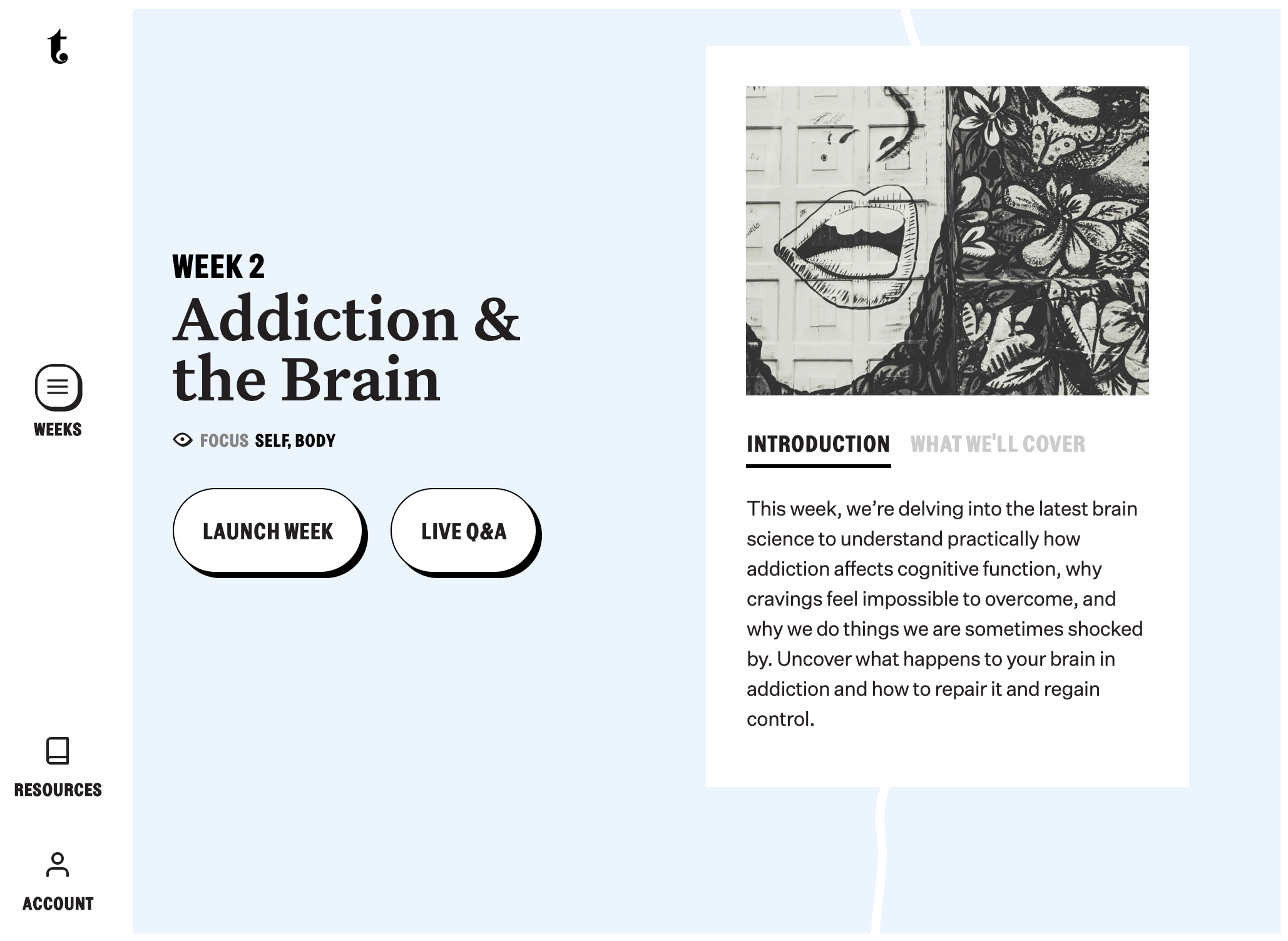
A snapshot of Tempestweekly coursework.
A holistic approach
Founded in 2014, New York-based Tempest has raised about $14.3 million in total VC funding. Whitaker previously spent five years at One Medical, where she was the director of revenue cycle operations. Since founding Tempest, which has enrolled 4,000 participants to date, Whitaker received a two-book deal from Random House to document her methodologies and path to sobriety. Her first book, ‘Quit Like a Woman: The Radical Choice to Not Drink in a Culture Obsessed with Alcohol,& will be released on December 31.
Today, her business has 28 employees and plans to build out its team, invest in marketing — where ithistorically had very low spend — and explore business opportunities within the enterprise using cash from the $10 million Series A.
&Sobriety, and the refusal to partake in alcogenic culture, is subversive, rebellious, and edgy.& - Tempest
The company is careful to clarify itnot a detox or 12-step program, like Alcoholics Anonymous, which is structured around the Twelve Steps to recovery. Rather, Tempest can be used in combination with other programs or therapies, or as a first step down the path to recovery. Whitaker explains Tempest isn&t only for the clinically addicted or those who consider themselves addicts or alcoholics. The company welcomes people who have rejected these labels or simply want to cut alcohol out of their life.
&Tempest grew out of my own experience,& Whitaker, who has previously struggled with alcoholism and an eating disorder, tells TechCrunch. &It was a response to the lack of desirable and accessible options to address problematic drinking, the lack of options available for people who don&t identify as alcoholics but struggle with alcohol and the lack of options that have been created for women and other individuals. Everything had been created for men.&
Tempest is tailored to the needs of women and historically oppressed individuals, says Whitaker, though all genders are welcome to complete its course. Taking a holistic approach to recovery, participants are encouraged to address the factors that led them to drink in the first place, including &love lives, poor nutrition, stress, anxiety, crap friendships, consumerism, lack of purpose, unresolved family of origin issues, disenfranchisement, poverty, tight or unmanageable finances, lack of connection, fear, shitty jobs we hate, depression, unprocessed trauma, lack of meaning, unfulfilled dreams, never-ending to-do lists, never-measuring-upness,& the company writes.
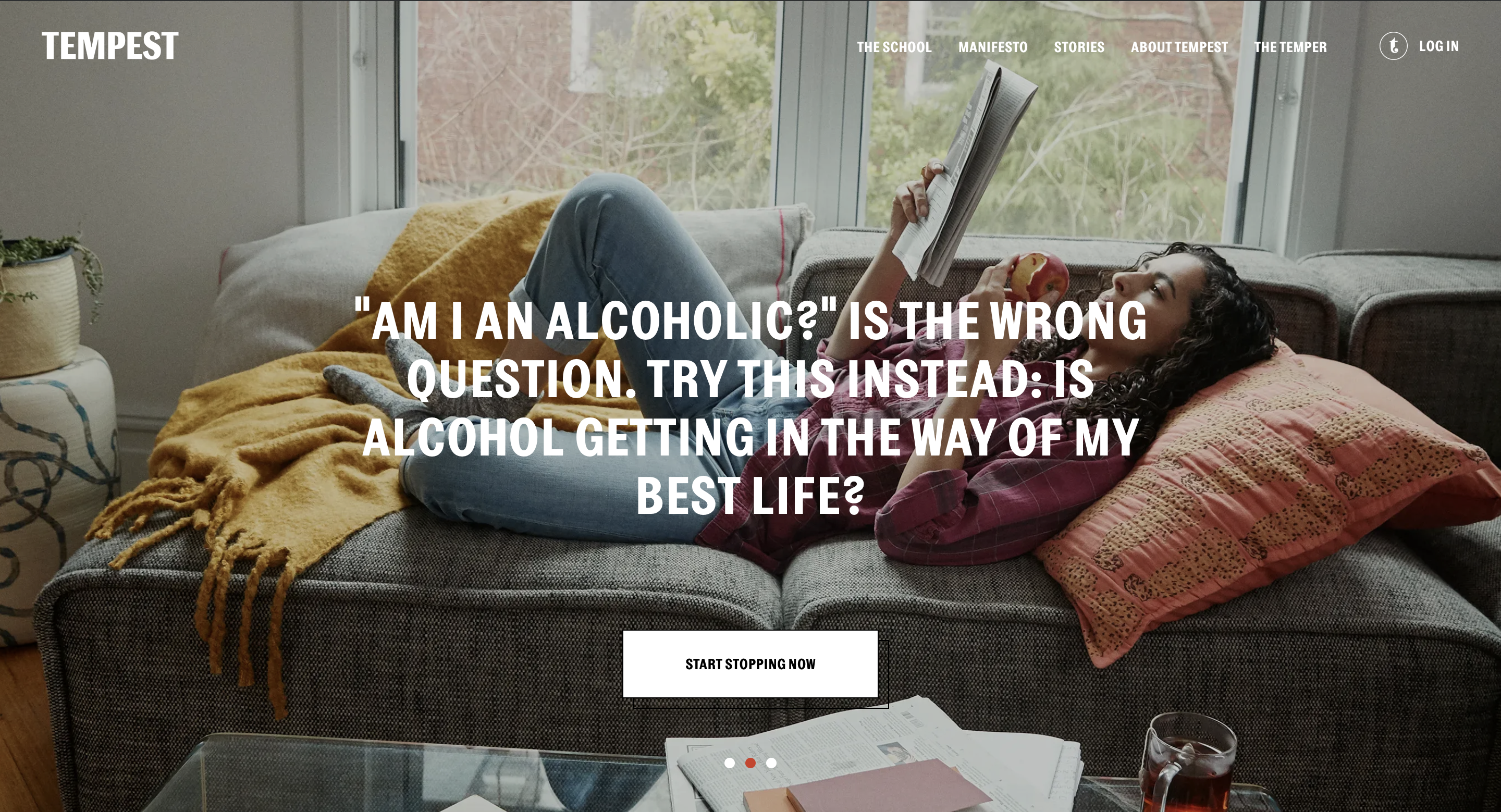
Tempestwebsite
But what about A.A.?
I had the same question.
Alcoholics Anonymous (A.A.), the most popular and accessible approach to recovery, is free and open to anyone willing to acknowledge they have a drinking problem. A nonprofit organization, A.A. has more than 115,000 groups worldwide. The 84-year-old program is built on peer-support groups that gather regularly for discussion meetings. Over time, more seasoned members can become &sponsors,& helping newer entrants work through the Twelve Steps.
Tempest, alternatively, is taking a for-profit approach, charging for its tech-infused method. And where A.A. emphasizes in-person support groups, Tempest relies on video streams. Increasingly, telemedicine startups are enticing customers with convenient options for health and wellness care but whether people will truly pivot to telemedicine, tele-therapy or virtual sobriety schools is still up for debate. As for Tempestsimilarities to A.A., Whitaker says: &The only thing they have in common is that they are working to help people quit alcohol.&
&By just trying on sobriety or questioning our drink-centric culture, you are profoundly ahead of the pack.& - Tempest
In selling its sobriety school, Tempest evokes a sense of coolness, with phrases like &Sober is the new black& and &Your hangover goes away. Your social life doesn&t,& plastered on its website. In providing a priced and more exclusive route to sobriety, one might question Tempestethics and motivations as it builds a business that capitalizes off of substance abuse. Whitaker, in defense, explains a virtual school fit for the historically powerless is a necessary addition to existing options: &Our program is centered on individuals who have been held out of power, who have been told to shut up and listen,& she said. &We aren&t looking at white, upper-class men. We are looking at a queer person from 2019.&
According to survey data published by Recovery.org, 89% of A.A. attendees are white, while 38% are female.
Refusing ‘alcogenic culture&
Tempestbranding takes a cue from the D2C playbook. The company, led by women, has the opportunity to become the brand that represents sobriety, and ittaking it. TempestSeries A, coupled with the influx of new-age non-alcoholic beverage brands backed by VCs, is representative of the perceived shift away from alcohol among the younger generations.
Millennials are drinking less alcohol and, according to the World Health Organization, there are 5% fewer alcohol drinkers in the world today than in 2000. Tempestschool seems to cater more to the cohort of people who view ditching alcohol as a lifestyle perk, not those who stop drinking due to addiction.
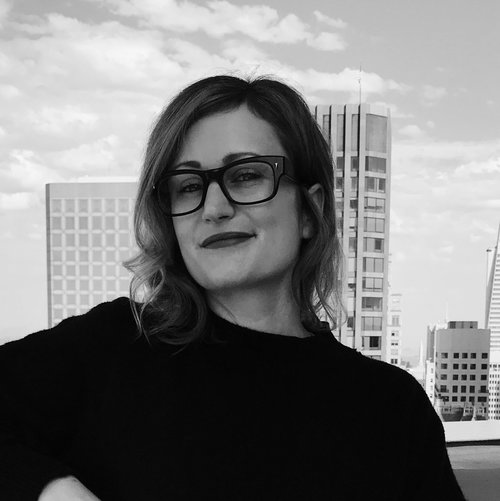
Tempest founder and CEO Holly Whitaker
Seedlip, a non-alcoholic spirits company, and IndiaCoolberg Beverages, which makes non-alcoholic beer, recently raised VC to cater to a similar demographic. Meanwhile, CBD-infused beverage brands like Sweet Reason, Cann and Recess are trendy and raising venture money. None of these, of course, are solutions for someone struggling with alcohol. Capital flowing into these brands merely indicates venture capitalists& belief that consumers are steering away from traditional liquor and toward new products fit for a generation that is drinking less alcohol.
&By just trying on sobriety or questioning our drink-centric culture, you are profoundly ahead of the pack and among good company,& Tempest writes on its website. &Remember: 70-80% of adults drink depending on where you live; drinking is basic. Sobriety, and the refusal to partake in alcogenic culture, is subversive, rebellious, and edgy.&
Tempest says it has completed an efficacy study performed in consultation with researchers affiliated with the University of Buffalo and Syracuse University. In several years& time, we&ll know whether the countless think pieces claiming millennials are done with alcohol were indeed true and whether the VC money into these upstarts was wasted or pure genius. As for Tempest, even if just providing a designated place on the internet for discussions around the struggles or benefits of sobriety, it has the potential to make a big impact on those in recovery or those seeking a lifestyle change.
&Alcohol is very similar to cigarettes,& Whitaker said. &We are in a time that we think drinking alcohol is natural, that we are supposed to do it. I thought that would change because to me, alcohol is entirely toxic. We are approaching this tipping point of realizing how toxic and unnecessary it is.&
Tempest is also backed by AlleyCorp, Refactor and Green D Ventures. MaveronAnarghya Vardhana has joined the startupboard of directors as part of the latest deal.
- Details
- Category: Technology
Read more: Startup says ‘Sober is the new black’
Write comment (99 Comments)From food and drink to health and wellness and beyond, thereone plant we can&t seem to get enough of: cannabis. It seems like every consumer product nowadays is taking part in reefer madness.
Home cooks are taking edibles to new heights. In places likeDenverandCalifornia, you can take cooking classes specifically centered around food made with Mary Jane. The editors of Vice&Munchies& even put out a cookbook last year called Bong Appétit: Mastering the Art of Cooking with Weed.And itonly one ofmany.
But marijuana culture today isn&t all based around the stuff you (er, people you know) smoked in college. Cannabis, long known for itsmedicinal and therapeutic purposes, is a hot commodity in food tech and other consumer products nowadays. Far more than just a way to get high, cannabis in its various forms has been used medically throughout history and in modern times as a treatment forpain and nausea, and has been found anecdotally or in limited studies to treat glaucoma, epilepsy and anxiety, among other conditions and symptoms. Businesses have caught on, and not a moment too soon.
The food products that utilize marijuana are a far cry from the old classic pot brownies (not that thereanything wrong with those!). Thanks to modern science, producers are able to separate the two main chemical compounds found in marijuana: THC and CBD. THC has therapeutic benefits, but itbest known as the part of weed that gets you high. This is because ita psychoactive compound. CBD, on the other hand, is not psychoactive — it can (supposedly) provide many of the anti-anxiety, analgesic benefits of the plant without producing a high. For obvious reasons, this gives marijuana a new appeal. Itnow possible to reap the benefits of the plant without experiencing intoxication, so you can lessen anxiety or pain while still functioning normally.
Itworth noting at this point that many of the health benefits of CBD and cannabis in general are not scientifically proven in statistically significant, peer-reviewed studies. This is for a number of reasons, most significantly that marijuana is still a Schedule 1 controlled substance under federal law in the U.S., making legality an issue in its study.
Clearly, the lack of scientific evidence isn&t diminishing anyonedesire for herbal refreshment.
But what CBD and other cannabis products lack in evidence, they make up for with enthusiasm. Companies and consumers alike are eager to try CBD in various products, from food to oils to skincare, in hopes of treating anxiety, sleeplessness and other woes. If you live in a place where CBD products are legal, you&ve probably seen them everywhere. Newsweek reported that CBD sales are estimated to grow 40-fold in the next four years, reaching a value of $23 billion. The big business of marijuana and CBD — California-based Arena Pharmaceuticals is the biggest publicly traded cannabis company in the world — is only growing.
You can already find CBD candies and oils at major national retail chains like CVS and Walgreens, and in states and municipalities where itlegal, green connoisseurs can order CBD-infused lattes and cocktails. Even retailers like Sephora, Neiman Marcus and Barneys are selling curated displays of CBD-infused beautyand skincare products. The aforementionedNewsweekarticle reports that big names like Coca-Cola and Molson Coors Brewing are among the hordes of companies already working on their own CBD products. Clearly, the lack of scientific evidence isn&t diminishing anyonedesire for herbal refreshment.
Except for the FDA, that is. Thelegality of marijuana and CBD is a confusing and often contradictory topic, and a hard one to keep track of because itchanging all the time at the federal, state and municipal levels. But what can be ascertained is that because so much of the CBD industry is operating outside of any kind of government oversight, legally or otherwise, the quality of products can vary widely. This is something about which the FDA and independent doctors and pharmaceutical experts have raised concerns. Apart from companies making unfounded claims about the effects of their products, the actual ingredient makeup may be inconsistent, with some products containing less CBD than their labels claim. Little regulation and nascent standards of quality mean consumers might not always know what they&re getting.
But given the broad interest in CBD, thatunlikely to remain the case forever. The FDA may have started cracking down on extralegal CBD product sales, but in the grand scheme of things, that only means that the agency recognizes the significance of the compound. CBD probably isn&t going away anytime soon, and among the food, drug, health and cosmetic industries, the race to do it best and biggest has already begun.
- Details
- Category: Technology
Read more: The budding industry of cannabis tech
Write comment (100 Comments)
The reMarkable tablet is a strange device in this era of ultra-smart gadgets: A black and white screen meant for reading, writing, and sketching — and nothing more. Yet the company has sold 100,000 of the devices and now has attracted $15 million in series A funding from Spark Capital.
Itan unusual trajectory for a hardware startup exploring a nearly unoccupied market, but CEO Magnus Wanberg is confident thatbecause this category of device is destined to grow in response to increasingly invasive tech. Sometimes an anti-technology trend is the tech opportunity of a lifetime.
I reviewed the reMarkable last year and compared it with its only real competition, the Sony Digital Paper Tablet. It was launched not on Kickstarter or Indiegogo but with its own independent crowdfunding campaign — and considering we&ve seen devices like this attempt such a thing and either let down or rip off their backers, that alone was a significant risk.
The device has been a runaway success, though, selling over 100,000 units — and attracting investment in the process. When I talked with Wanberg and co-founder Gerst about their new A round, the conversation was so interesting that I decided to publish it in full (or at least slightly edited).
How did they get here? What would they have done differently? Is the threat of the &smart& world really a thing? Why fight tech with more tech?
Devin: So you guys raised some money, thatgreat! But itbeen a while since we talked. I think itimportant to hear about the progress of unique companies that are doing interesting things. So first can you tell me a little about what the companybeen busy with?
Magnus: Well, we&ve created this wonderful product, the reMarkable paper tablet. We&ve been very focused on that effort, based on a love for paper and a love for technology, to see if we can find some ways to join these two together to help people think better. Thatsort of the the whole ethos of the company.
So for the last six years, we&ve just been grinding away… you know, we&re a small player up against the big guys on this. So we&ve been sort of fighting guerrilla warfare trying to trying to establish ourselves.
And we were successful, fortunately, when we did our pre-order campaign, because as we found out, we weren&t the only ones who who love this notion of thinking better with the paper tablet, seeing paper as a powerful tool for thinking and for creating.
- Details
- Category: Technology
Read more: With $15M round and 100K tablets sold, reMarkable CEO wants to make tech ‘more human’
Write comment (91 Comments)The Daily Crunch is TechCrunchroundup of our biggest and most important stories. If you&d like to get this delivered to your inbox every day at around 9am Pacific, you can subscribe here.
1. AppleMacOS Catalina is now available
Catalina bucks the trend of recent MacOS updates with some pronounced changes — the underlying principles are the same, but the latest version of Apple Mac operating system makes some fundamental updates to popular apps, like getting rid of iTunes.
Brian Heater argues that these changes will have an immediate impact on current usage while also laying the groundwork for future evolutions.
2. Sonynext console is… the PlayStation 5, arriving holidays 2020
The company is saving most of the details for future announcements, but it did reveal a few things about the upcoming game console — like the fact that the controllers will include new haptic feedback.
3. Group Nine acquires PopSugar
Earlier this year, there were reports that Group Nine — which was formed by the merger of Thrillist, NowThis, The Dodo and Seeker — was in talks to acquire a different womenlifestyle publisher, Refinery29, which was ultimately acquired by Vice Media instead.
4. Chinese firms Tencent, Vivo and CCTV suspend ties with the NBA over Hong Kong tweet
Smartphone maker Vivo, broadcaster CCTV and internet giant Tencent said today they are suspending all cooperation with the National Basketball Association, becoming the latest Chinese firms to cut ties with the league following a tweet from a Houston Rockets executive supporting Hong Kongpro-democracy protesters.
5. Operadesktop browser gets built-in tracking protection
The marquee feature of Operalatest desktop browser is the addition of a blocker that will make it harder for advertisers and others to track you while you browse the web — and which has the additional benefit of speeding up your browsing session. In fact, Opera argues that turning on both the tracking protection and the built-in ad blocker can speed up page loads by up to 23%.
6. Via is launching an on-demand public transit network in the city of Cupertino
The aim is for these on-demand shuttles — starting with six vans branded with the city of Cupertino logo — to provide more efficient connections to CalTrain and increase access to public transit across the city.
7. Laurel Bowden of VC firm 83North on the European deep tech and startup ecosystems
London and Tel Aviv-based VC firm 83North has closed out its fifth fund at $300 million. In a conversation with general partner Laurel Bowden, the veteran investor shared a few thoughts about the tech scene in Europe versus Israel, what the firm looks for in a team and how to scale globally. (Extra Crunch Membership required.)

- Details
- Category: Technology
Read more: Daily Crunch: Apple releases latest MacOS update
Write comment (96 Comments)Page 690 of 5614

 5
5





